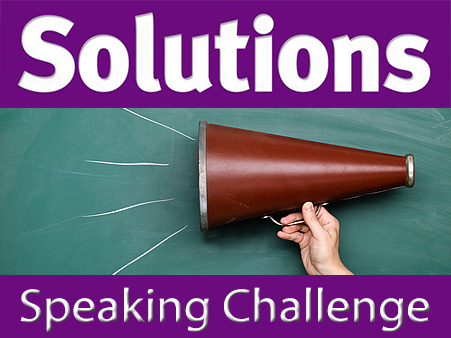
With 20% of the vote, the most popular speaking challenge was: ‘In group or pair speaking activities, my students chat in their mother tongue’. Most of the teachers who took the survey seem to agree that group and pair work is a valuable activity, but one that can be difficult to manage in the classroom.
Albina in the Czech Republic said: “I’m sure that doing speaking activities in pairs or in small groups of peers is a great way to practice what the students have just learned. However, as long as my students know that I’m not listening to their pair, after saying a few words in English, most of them immediately start speaking in their mother tongue to avoid difficulties with finding words to express themselves. So the activity doesn’t work in the proper way. I really want a break through.”
Dusican in Serbia faces a similar challenge: “Most of my classes are quite big – even up to 40 students, so group or pair work is absolutely a must-have. However, most of the students scribble a few notes down and proceed chatting in Serbian. To be fair, they often talk enthusiastically about the given topic! I feel that they think it’s only learning if they talk directly to a teacher, or at least it only counts.”
We will be tackling this challenge in January and February so look out for further blog posts in the next few weeks with ideas to motivate your students to speak more in English during group and pair work.
The second most popular challenge with 15% of the vote was: ‘My students say the absolute minimum’. Rachel in Switzerland articulated how frustrating this can be: “I just want them to naturally speak as much English as possible in the classroom without me hissing ‘in English’ every 2 minutes!”
Martina in Czech Republic could also relate to this challenge: “When I want my students to speak in pairs, they just say basic things and are not willing to add details. Even when I ask them, they just answer it and that’s it.”
Another teacher in the Czech Republic expressed how demotivating this can be in class: “I feel exhausted when I explain the activity several times for everybody to understand the task perfectly and the only reply is one or two word answers.”
We will be tackling this challenge in March and April 2014.
The final challenge that made it into our top 3 with 14.5% of the vote was: ‘it’s so hard getting the weaker students to join in.’ Jana from Czech Republic explains: “Weaker students are too shy to speak in front of the class and when I ask them to discuss things in pairs or small groups, the stronger students dominate the conversation.”
Plamen from Bulgaria adds: “In mixed-ability classes students that learn faster, or that have a prior knowledge, tend to be more active in the speaking activities and, answering correctly, further discourage the weaker students, who don’t want to make mistakes in front of the class and the teacher. This trend deepens with the progress of the school year.”
In May and June 2014 we will be asking our Oxford Teacher Trainers for some ideas and hints on how we can get our weaker students to contribute more in English.
Do you agree with the top three speaking challenges? What would you have voted for?